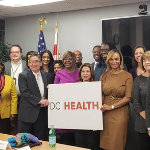Health Equity
Medicaid Enrollment Touches 39% of the Residents of The District of Columbia; DC’s 70/30 FMAP is Vital for the Maintenance of Health & Human Services
A reduction in the District’s FMAP would not lead to long-term government savings and would have a ripple effect throughout the entire health system in the DMV, crippling access to care for not only Medicaid beneficiaries but also all those who live, work, and visit the District of Columbia, including members of Congress and their staffs.
.png?sfvrsn=9ac2d21b_0)
Why does DC receive an Enhanced FMAP Rate?
The DC FMAP rate of 70% established by the Revitalization Act resulted from bipartisan analysis, discussion, and negotiation by Congressional leadership aiming to balance fairness with the District’s restricted ability to generate revenue. Congress recognized that the District of Columbia faces unique financial challenges due to its non-state status and the significant amount of federally-owned land within its boundaries. The District is unable to tax non-residents’ earnings, so these workers pay no taxes to support the infrastructure and services, such as roads, public safety and emergency services that they benefit from in the District. The District is also unable to tax up to 40% of the real property within its borders due to statutory restrictions.
Why are we concerned about DC's FMAP now?
Members of Congress have proposed reducing the DC FMAP to the statutory minimum for all other states, which is currently 50% (but could be reduced even more). Such a change would impact every physician and every practice, regardless of type, location, and payers contracted. Even practices who take no insurance will not be able to send patients for specialist care, hospital admissions, or other types of care.
What can MSDC members do?
- If you know a member of Congress or staffer, reach out to them and share how DC cuts will hurt your patients.
- Share your relationships and outreach with hay@msdc.org so we can help coordinate advocacy efforts.
- Email hay@msdc.org if you would like to be paired with a physician member of Congress office and trained by MSDC staff on how to reach out.
Resources
- DC FMAP cut fact sheet
- California Medical Association fact sheet on Medicaid cuts
- MSDC and healthcare association letter to Congress arguing against DC FMAP changes.
- MSDC original story on Medicaid changes.
News, Statements, and Testimony on Health Equity Issues
DC Health Updates Reporting Process of COVID-19 Infected Personnel

A new DC Health notice requires healthcare personnel and their employers to report positive COVID-19 tests in their staff.
The notice requires employers to report any healthcare personnel infected with COVID-19 who work (residing in the District or elsewhere) in the District. This includes, "any employer that provides inpatient or outpatient healthcare services and is either licensed by DC Health or functions as an independent private practice through a certificate of need."
The notice applies to paid and unpaid persons working in a healthcare setting who could expose individuals or materials. The definition goes beyond medical personnel and essentially covers anyone who may enter a medical facility and works in the medical facility. Examples include clergy, environmental services, and volunteers.
Different types of healthcare facilities have different reporting requirements.
- Regardless of facility type, a death attributed to COVID-19 needs to be reported within 24 hours to coronavirus.hai@dc.gov. The email must provide the name, email, and direct line of the person reporting the death. DC Health will follow-up to get additional details.
- Hospitals, home health agencies, and hemodialysis facilities should report cases amongst covered persons by 12 PM on Wednesdays.
- Nursing homes and assisted living facilities should report cases by 3 PM daily
- Outpatient facilities should report cases within 24 hours
More information and reporting links can be found at the DC Health notice.

Leave a comment